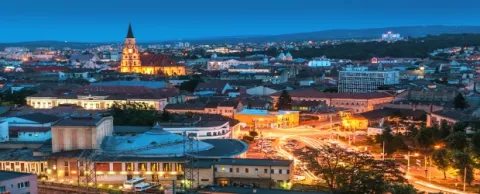
Located in northwestern Romania, Cluj-Napoca is considered the unofficial capital of the Transylvania region. The country’s fourth-most populous city is the economic hub of the region, home to a half-million inhabitants in the metropolitan area, as well as 12 universities and 80,000 students. In an effort to solve public problems and promote sustainable development, Cluj-Napoca is boosting “economic engines” in the creative industries and university sector. Let’s take a look at how Romania’s second city is stepping up as a technology hub that’s been nicknamed the “Silicon Valley of Eastern Europe.”- Bruno De Man
Romania’s tech hub
As a technology hub, the ultimate goal for Cluj-Napoca is to improve the quality of life for citizens by focusing on five main areas: transport and mobility; citizen engagement; energy; infrastructure; and Internet access. More than 15,000 people work in the local IT sector, and the city is home to nearly 1,300 IT businesses, which mostly focus on outsourcing and process optimization. The city is now looking to give the IT industry a boost of creativity to help strengthen innovation and the development of new products, creating the Transylvania Industries Cluster—the first in Romania—that works alongside local universities. Through these types of collaborations, the city hopes to “create a cluster effect that allows competitiveness growth through information exchange, business partnerships, and economies by using shared resources (spaces and equipment).”
Cluj-Napoca is also sinking 40 million euros into the development of its tourism and cultural attractions, improving connectivity and municipal services in the process. One great example of how Cluj-Napoca is boosting sustainability and making its systems more streamlined: a smart parking system in the city centre. In an effort to move away from a cash society and reduce air pollution, the city has developed an app that signals available parking spaces in real time and allows drivers to easily pay online. The public transport system is also transitioning to become more carbon friendly, adding 10 electric buses to the fleet, with plans for 20 more on the way. Catering to a smartphone society, apps have been created for public transport, guided city tours, and city administration services. Thanks to the “My Cluj” app, citizens can quickly engage with city officials on any issues they may have, as well as access administrative documents like agreements and certificates. Since launching, more than 5,000 users have signed on and reported issues on the app. By creating a city of “smart citizens” and offering them the technology and tools to improve everyday issues, Cluj-Napoca is well on its way to achieving smart city status as Romania’s tech hub.



